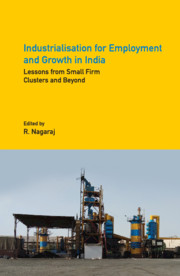Book contents
- Frontmatter
- Contents
- List of Tables
- List of Figures and Maps
- Preface and Acknowledgements
- 1 Introduction
- 2 Garment Cluster in Kolkata: The Untold Story of Expansion Relying on Low-end Domestic Demand
- 3 Constraints to Upgrading and Employment Expansion in the Tiruppur Knitwear Cluster
- 4 Determinants of Employment in the Indian Automobile Industry
- 5 Upgrading Technology and Space as Collective Strategy: Creation of Jobs and Market Potential in Gujarat’s Ceramic Clusters
- 6 Sports Equipment Manufacturing in India: A Firm-level Inquiry into Growth and Employment Dynamism
- 7 Aligarh Lock Cluster: Unravelling the Major Impediments
- 8 Continued Misery or a Change in Fortune? The Case of the Howrah Foundry Industry
- 9 Redevelop and Perish, or Survive and Grow? The Case for Supporting Informal Leather Enterprises in Dharavi, Mumbai
- 10 Growth Performance, Competitiveness and Employment in MSMEs: A Case Study of the Rajkot Engineering Cluster
- 11 Manufacturing and Automation
- About the Contributors
- Index
9 - Redevelop and Perish, or Survive and Grow? The Case for Supporting Informal Leather Enterprises in Dharavi, Mumbai
Published online by Cambridge University Press: 31 July 2021
- Frontmatter
- Contents
- List of Tables
- List of Figures and Maps
- Preface and Acknowledgements
- 1 Introduction
- 2 Garment Cluster in Kolkata: The Untold Story of Expansion Relying on Low-end Domestic Demand
- 3 Constraints to Upgrading and Employment Expansion in the Tiruppur Knitwear Cluster
- 4 Determinants of Employment in the Indian Automobile Industry
- 5 Upgrading Technology and Space as Collective Strategy: Creation of Jobs and Market Potential in Gujarat’s Ceramic Clusters
- 6 Sports Equipment Manufacturing in India: A Firm-level Inquiry into Growth and Employment Dynamism
- 7 Aligarh Lock Cluster: Unravelling the Major Impediments
- 8 Continued Misery or a Change in Fortune? The Case of the Howrah Foundry Industry
- 9 Redevelop and Perish, or Survive and Grow? The Case for Supporting Informal Leather Enterprises in Dharavi, Mumbai
- 10 Growth Performance, Competitiveness and Employment in MSMEs: A Case Study of the Rajkot Engineering Cluster
- 11 Manufacturing and Automation
- About the Contributors
- Index
Summary
Introduction
There is a vast and growing literature focusing on the economies of scale and scope (Marshall 1920) that industrial units get by agglomerating themselves into ‘industrial clusters’ (Canёils and Romijn 2003). Moving away from the micro-economic perspective of technological capacity at the firm level, these studies explore regional networks as contributing to technological capability and competitive advantage to industrial units (Pyke and Sengenberger 1992; Schmitz and Nadvi 1999). While thinking of small industrial clusters (SICs), it is often useful to consider them as networks of actors, grouped together in a geographical space, often competing with each other but also sharing technological know-how, facilities, skilled pool of labour and other resources (Varman and Chakrabarti 2011). For example, the clustering of knitwear units and their ancillary industries in Ludhiana played a critical role in its innovative transformation. However, the opening up of new market opportunities also explains the resilience of regional firms to the crises of 1990 and their recovery (Tewari 1999; Tewari and Pillai 2005). But mere survival does not mean that the cluster's technological capacity is close to competing at the international level, as the study of textile clusters in Panipat shows (Gulrajani 2006). The source of this dynamism lay in the strength of the organisational aspects of its production system, which did not guarantee its long-term survival. This study aims to focus on what policy support measures are required for industrial clusters in the informal sector to remain viable, innovate and acquire competitive advantage in international markets.
While in the literature, the advantage of industrial clusters and the policy support they require are often pitched in terms of the technological capacity and competitiveness of firms or the cluster in general, in the current context, industrial clusters have an important role of generating employment. There is a fair amount of evidence to show that the employment elasticity (rate of growth of employment with respect to the rate of growth of output) in India's manufacturing industry has declined in recent years. Keen observers of the economy have noted that ‘unlike China's or South Korea's growth through manufactured exports that absorbed low-skilled-labour in vast numbers, India's growth episode was led by a high-skilled service sector that failed to adequately absorb unskilled labour from agriculture’ (Kotwal and Sen 2019).
- Type
- Chapter
- Information
- Industrialisation for Employment and Growth in IndiaLessons from Small Firm Clusters and Beyond, pp. 196 - 222Publisher: Cambridge University PressPrint publication year: 2021



